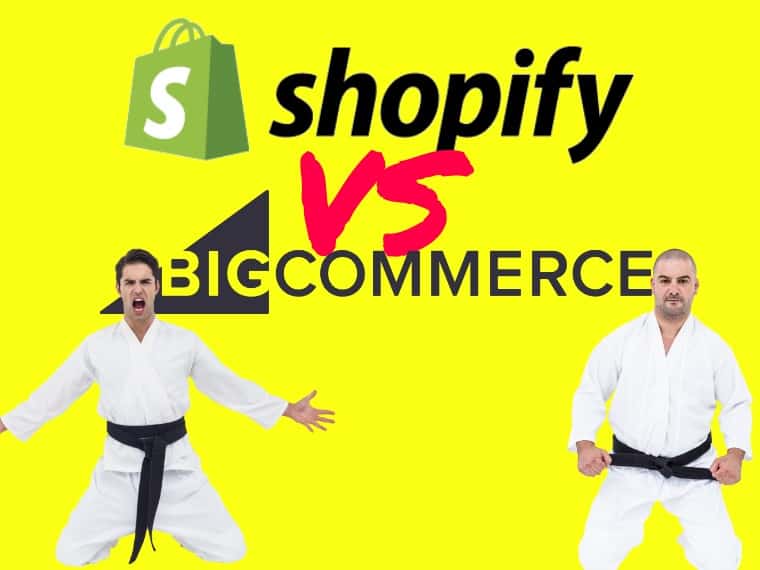Last Updated on
Ante Rados
Choosing the right platform for creating and running your eCommerce business is never easy. This is especially true when comparing these two eCommerce giants. I will tell you right away that they are more or less equally good. The choice between these two is mostly based on personal taste and preferences.
Both companies have an easy-to-use dashboard and excellent customer support and uptime. Most important of all, they are peerless when it comes to eCommerce features. It doesn’t matter if you want to create a small online store or a huge eCommerce enterprise, they’ve got you covered. So, what sets them apart?
Shopify has beautiful templates that can be customized extensively. Templates aren’t the only thing that can be customized, however. Shopify has a huge app market with over 4,000 apps, so you will be able to customize the functionality of your eCommerce website as well.
BigCommerce has its own strengths and doesn’t lag far behind Shopify when it comes to templates. BigCommerce makes the process of website creation a breeze with their drag and drop builder. They also have better SEO options than Shopify. By the end of this review, you should be able to choose between the two easily, so sit tight and enjoy the ride.
BigCommerce is better than Shopify for blogging and SEO. It is also easier to create a website with BigCommerce because it utilizes a drag and drop website builder. Shopify, on the other hand, has a much bigger app store and better design of templates. Shopify’s templates also come with more customization options. Since the difference in the quality of templates is bigger than the difference in SEO features, Shopify is the better choice overall.
You might also like:
BigCommerce vs Shopify comparison

In this review, I rated Shopify and BigCommerce in 10 different categories. In the end, I summed up their scores in individual categories and gave each of them an overall rating. You can read the whole review or jump to the category you are especially interested in. Just don’t forget to use the switch that toggles between the two eCommerce platforms.
Shopify or BigCommerce ease of use
Shopify
☆☆☆☆☆ 4.5/5
BigCommerce
☆☆☆☆☆ 4.5/5
Even the best eCommerce platform would be useless if it was too complicated to use. Luckily, both Shopify and BigCommerce take ease of use seriously, but there are a few differences between the two.
Shopify has a separate editing interface and dashboard for managing sales. You will have to jump back and forth when you start your store. As your store grows, the need for editing your website will reduce, while time spent on managing sales will increase. This makes Shopify excellent in the long run.
Users that have experience with using WordPress will feel at home with Shopify because Shopify uses a similar interface to WordPress.
BigCommerce relies on built-in features, while Shopify relies on the app market for adding functionality to your store. This makes Shopify’s interface cleaner and easier to navigate for beginners. As your store grows, you can add apps that will improve the functionality of your store. Such scalability makes Shopify easy for managing both small stores and huge eCommerce enterprises.
I already said that both platforms are easy to use. However, neither of them is the simplest eCommerce platform out there. The reason behind that is that both BigCommerce and Shopify are built to support huge online stores.
If this review was written some time ago, I would tell you that Shopify is easier to use. However, Bigcommerce recently added a drag and drop page builder. You can’t get an easier experience for creating pages than the one you get with a drag and drop page builder.
Management of sales and adding products with BigCommerce is no harder than with Shopify. Separate interfaces for managing sales and editing your storefront also make the two eCommerce platforms similar.
One thing that new users might find confusing is the number of features they will encounter early on. BigCommerce relies on in-built features. When you just start out with your store, you won’t need lots of those features. They will just get in your way while you are looking for the features you need.
Shopify vs BigCommerce website builder
Shopify
☆☆☆☆☆ 4.5/5
BigCommerce
☆☆☆☆☆ 5/5
When choosing an eCommerce platform, you probably want to know how good and simple to use is their website builder. You will be glad to know that Shopify vs BigCommerce website builder duel is a tough one because both platforms have excellent website builders.
Shopify’s website builder has a clean interface that feels similar to WordPress. The builder is armed with powerful eCommerce tools and capable of creating complex stores. Since Shopify relies on apps from the app market to expand on the functionality of your website, you will get a clean interface that is easy to navigate.
Once you create the skeleton of your website, you can easily upgrade it by adding some apps from the app market.
BigCommerce’s website builder is also capable of creating both simple and complex stores.
Unlike Shopify, BigCommerce doesn’t rely on the app market; it has numerous in-built features. That makes BigCommerce’s website builder a bit harder to navigate than Shopify’s. Don’t let this discourage you from using BigCommerce; they are constantly working on making the user experience as easy as possible.
Recently, they added a drag and drop website builder. This makes the job of creating an online store with eCommerce incredibly simple.
Drag and drop website builders are limited in what they are capable of creating. Don’t worry, for more complex edits of your website, you can edit HTML and CSS.
Shopify and BigCommerce templates, themes and customizability
Shopify
☆☆☆☆☆ 5/5
BigCommerce
☆☆☆☆☆ 4/5
Shopify has eight free themes and 72 premium themes. All premium themes cost between $140 and $180 each. Both free and premium themes come with industry-specific features included. This is important to know when choosing a theme. It is better to choose a theme based on industry and edit the looks than the other way around.
You can customize both templates and sections. When you customize a template, all the changes will appear on all relevant pages on your website. With sections, customization options will vary on the section you select.
The good thing about Shopify templates is that you get access to numerous fonts with both free and premium templates.
This BigCommerce vs Shopify battle goes in favor of Shopify. Shopify has a smaller number of themes, but there are more differences between them. Shopify’s themes also have a better design out of the box.
BigCommerce has 12 free themes and 130 premium themes. Bigcommerce’s premium themes cost between $150 and $300.
Although there is a bigger choice of templates with BigCommerce, those templates are more similar to each other than Shopify. Because of those similarities, you will feel like you have more choice with Shopify.
One important thing to note is that BigCommerce’s drag and drop editor makes the templates easier to edit.
When it comes to what you can customize, both companies are performing equally well. You can edit most of the basic stuff from the editor. If you want to do some more in-depth editing, both companies will let you edit HTML and CSS.
Compare BigCommerce or Shopify eCommerce features
Shopify
☆☆☆☆☆ 5/5
BigCommerce
☆☆☆☆☆ 5/5
Ecommerce features are the most important features for an online store. So, who has better eCommerce features, Shopify or BigCommerce?
One of the first things you will want to know before creating your online store is what payment gateways you will have access to. It is hard to compete with Shopify in this category because they support over 100 payment gateways, including cryptocurrencies. You can check out the full list here.
Shopify shines in product management. One of the great features Shopify supports is the option to create smart product collections. With this feature, you can set criteria for products you want in that collection, and Shopify will automatically add all your products that fit the criteria to the collection.
Both companies have support for abandoned cart recovery, selling in multiple currencies, options to set shipping rates, and all other basic features you would expect from a good eCommerce platform.
BigCommerce is one of the rare eCommerce platforms that are capable of competing with Shopify on equal ground.
They also support major payment gateways, but the list is somewhat smaller than Shopify’s. You can check out all payment gateways they support on their website.
While there is no option like smart collections that Shopify offers, BigCommerce wins the battle when it comes to product options. They let you create up to 250 different product options. Shopify, on the other hand, lets you create only 6 product options unless you install a third-party app.
If you sell products that require customers to enter some data or upload images, you will be happy to know that BigCommerce has integrated support for those features. With Shopify, you will have to use a third-party app to get access to those features.
Both companies have good eCommerce features, and each of the companies does some things better than the other. If you are trying to choose whether to use Shopify or BigCommerce, eCommerce features aren’t an issue because both companies are equally good in this category.
Shopify vs BigCommerce SEO
Shopify
☆☆☆☆☆ 4/5
BigCommerce
☆☆☆☆☆ 4.5/5
Basic SEO features are something you expect to get from any hosting or eCommerce company out there. You would be surprised at how many companies don’t let you add meta titles, URL slugs and similar basic features. Fortunately, you get access to those features with Shopify.
If you are a blogger trying to decide whether to choose BigCommerce or Shopify for a small store you want to start, the answer is: you should choose neither of the two.
Both companies are geared for supporting all businesses of all sizes, but they are both lacking in the blogging department. For example, you won’t have access to most basic blogging features like blog-specific search features and social bookmarking.
With BigCommerce, you will also be able to use the basic SEO features. In addition to the basics, BigCommerce has some extras. For example, BigCommerce has support for fully editable URLs. That option allows for better SEO optimization of your website.
As I already mentioned, neither of the platforms is a good option for blogging, but with BigCommerce, you will at least be able to create blog categories, so that is another win for BigCommerce.
If we ignore the lack of blogging features, both companies are performing well SEO-wise. However, BigCommerce has a more versatile set of SEO tools.
BigCommerce and Shopify app stores
Shopify
☆☆☆☆☆ 5/5
BigCommerce
☆☆☆☆☆ 4.5/5
Shopify has a huge app store with over 4,000 apps. Apps are divided into categories and subcategories, so it is easy to find the app you need even if you don’t know the name of the app.
You can also search for apps by collections. In collections, you will find apps sorted based on a variety of criteria; for example, some collections are created for different stages of businesses and others are created to contain all apps that work with a certain feature.
Based on the size and versatility of the app stores, Shopify is the winner in this category.
Although Shopify has a bigger app store, BigCommerce’s app store is also decently sized. It offers over 750 apps.
Don’t forget that BigCommerce relies on inbuilt features, so you won’t need as many third-party apps as with Shopify. However, if you like to customize your website through apps, Shopify is the better choice here.

Our #1 Choice For Hosting Blogs
62% Off Exclusive Offer Applied at Checkout
Regularly
$6.95/mo
Starting From
$2.64/mo*
- Free 1 Year Domain Registration on Select Plans
- FREE SSL Certificate
- Drag-and-drop Website Builder
- E-commerce Ready
- 1-Click WordPress Installation

BigCommerce vs Shopify domain costs
Shopify
☆☆☆☆☆ 4.5/5
BigCommerce
☆☆☆☆☆ 4.5/5
Shopify is an eCommerce platform and a domain registrar, so you can get all the necessary services for your online store in one place.
Average domain prices range between $10 and $20. You can get cheaper domain registration with a third party domain registrar, but it is good to know that you can register a domain, create your store and host it with Shopify.
Similarly, as with Shopify, BigCommerce will allow you to register a domain with them. Some domains are cheaper with Shopify, while others are cheaper with BigCommerce, but the prices are similar.
BigCommerce and Shopify customer support
Shopify
☆☆☆☆☆ 5/5
BigCommerce
☆☆☆☆☆ 5/5
Shopify has a phone, live chat and email support that are all available 24/7. Their support team is helpful, professional and quick to answer.
Based on the customer reviews of their support service, it is unlikely that you won’t be satisfied.
BigCommerce also has 24/7 phone, live chat and email customer support. Local phone support is available in nine countries.
Both companies have excellent support teams, but BigCommerce has a more extensive knowledgebase.
Shopify vs BigCommerce speed, uptime and reliability
Shopify
☆☆☆☆☆ 5/5
BigCommerce
☆☆☆☆☆ 5/5
This is another category you won’t have to worry about, no matter which one of the two you choose.
Shopify has 99.99% uptime and uses CDN so you can rest assured that your eCommerce website will be quite fast.
BigCommerce has a 99.99% uptime guarantee. The average response time of websites hosted on BigCommerce is 0.3 seconds, and response times hardly get faster than that.
All Shopify and BigCommerce servers are PCI DSS certified, so you shouldn’t worry about credit card data breaches either.
Shopify vs BigCommerce pricing
Shopify
☆☆☆☆☆ 4.5/5
BigCommerce
☆☆☆☆☆ 4.5/5
Shopify has three plans with a big price difference between each of them. Here is the full list of features for each plan:
Basic Shopify: $29/month
- Free SSL certificate
- 2 staff accounts
- 2.9% + $0.30 online credit card rate
- 2.7% in-person credit card rate
- 2% additional fee if you are not using Shopify Payments
- Up to 64% shipping discount
- Multi-channel integration
- Manual order creation
- Discount codes
- Abandoned cart recovery
- Gift cards
- Print shipping labels
- Shopify POS
Shopify: $79/month
- All from the Basic Shopify Plan
- 5 staff accounts
- 1-5 store locations
- 2.6% + $0.30 online credit card rate
- 2.5% in-person credit card rate
- 1% additional fee if you are not using Shopify Payments
- Up to 72% shipping discount
- USPS Priority Mail Cubic pricing
- Professional reports
Advanced Shopify: $299/month
- All from the Shopify plan
- 15 staff accounts
- Up to 8 store locations
- 2.4% + $0.30 online credit card rate
- 2.4% in-person credit card rate
- 0.5% additional if you are not using Shopify Payments
- Up to 74% shipping discount
- USPS Priority Mail Cubic Pricing
- Advanced report builder
- Third-party calculated shipping rates
Like most of the previous categories, Shopfiy vs BigCommerce pricing duel results in a tie. Shopify and BigCommerce plans have almost the same prices and offer similar value. You should pay attention to all of the features that come in their plans and choose based on the features you need more.
BigCommerce prices for plans are almost the same as Shopify’s prices. Each of the plans costs only $0.95/month more than Shopify’s plan in the same price range.
Standard: $29.95/month
- Free SSL certificate
- No transaction fees
- Facebook and Instagram integration
- Product ratings and reviews
- Discount codes
- Gift cards
- POS
- Real time shipping rates
- Shipping label discounts
Plus: $79.95/month
- All from the Standard plan
- Abandoned cart recovery
- Persistent cart
- ShipperHQ shipping rules engine
- Stored credit cards
Pro: $299.95/month
- All from the Plus plan
- No transaction fees on major payment gateways
- Fraud monitoring and analytics
- Customer groups and segmentation
- Google customer reviews
- Product filtering
- Custom SSL
As you can see, both companies offer similar features at similar price ranges. One benefit of Shopify is that you get abandoned cart recovery in the cheapest plan, but on the other hand, you get access to an unlimited number of staff accounts in all BigCommerce’s plans.
Both companies offer the same value for your money, so pricing shouldn’t be an issue when trying to choose between the two.
Shopify vs BigCommerce conclusion
The winner is Shopify!
I choose Shopify as an overall winner here, but BigCommerce isn’t far behind Shopify. It is actually outperforming it in some categories. They are equally good in most of the important aspects, but small details like better-designed templates and a wider selection of apps earned Shopify victory in this battle.
Shopify versus BigCommerce final score
Shopify and BigCommerce FAQs
What is the difference between Shopify and BigCommerce?
Is Shopify better than BigCommerce?
Does Shopify have better eCommerce features than BigCommerce?
Does Shopify have better templates than BigCommerce?
Is it easier to create an online store with BigCommerce than with Shopify?
Related articles:

Our #1 Choice For Hosting Blogs
62% Off Exclusive Offer Applied at Checkout
Regularly
$6.95/mo
Starting From
$2.64/mo*
- Free 1 Year Domain Registration on Select Plans
- FREE SSL Certificate
- Drag-and-drop Website Builder
- E-commerce Ready
- 1-Click WordPress Installation



